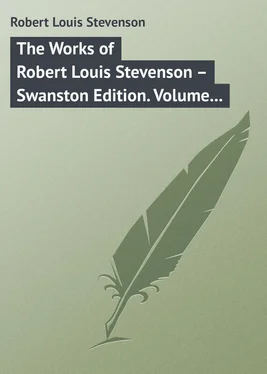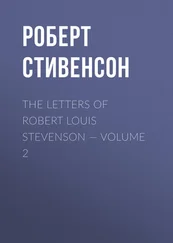Robert Stevenson - The Works of Robert Louis Stevenson – Swanston Edition. Volume 23
Здесь есть возможность читать онлайн «Robert Stevenson - The Works of Robert Louis Stevenson – Swanston Edition. Volume 23» — ознакомительный отрывок электронной книги совершенно бесплатно, а после прочтения отрывка купить полную версию. В некоторых случаях можно слушать аудио, скачать через торрент в формате fb2 и присутствует краткое содержание. ISBN: , Жанр: foreign_prose, на английском языке. Описание произведения, (предисловие) а так же отзывы посетителей доступны на портале библиотеки ЛибКат.
- Название:The Works of Robert Louis Stevenson – Swanston Edition. Volume 23
- Автор:
- Жанр:
- Год:неизвестен
- ISBN:http://www.gutenberg.org/ebooks/30894
- Рейтинг книги:3 / 5. Голосов: 1
-
Избранное:Добавить в избранное
- Отзывы:
-
Ваша оценка:
- 60
- 1
- 2
- 3
- 4
- 5
The Works of Robert Louis Stevenson – Swanston Edition. Volume 23: краткое содержание, описание и аннотация
Предлагаем к чтению аннотацию, описание, краткое содержание или предисловие (зависит от того, что написал сам автор книги «The Works of Robert Louis Stevenson – Swanston Edition. Volume 23»). Если вы не нашли необходимую информацию о книге — напишите в комментариях, мы постараемся отыскать её.
The Works of Robert Louis Stevenson – Swanston Edition. Volume 23 — читать онлайн ознакомительный отрывок
Ниже представлен текст книги, разбитый по страницам. Система сохранения места последней прочитанной страницы, позволяет с удобством читать онлайн бесплатно книгу «The Works of Robert Louis Stevenson – Swanston Edition. Volume 23», без необходимости каждый раз заново искать на чём Вы остановились. Поставьте закладку, и сможете в любой момент перейти на страницу, на которой закончили чтение.
Интервал:
Закладка:
Robert Louis Stevenson
The Works of Robert Louis Stevenson – Swanston Edition, Vol. 23
INTRODUCTION
The circumstances which have made me responsible for selecting and editing the correspondence of Robert Louis Stevenson are the following. He was for many years my closest friend. We first met in 1873, when he was in his twenty-third year and I in my twenty-ninth, at the place and in the manner mentioned at page 54 of this volume. It was my good fortune then to be of use to him, partly by such technical hints as even the most brilliant beginner may take from an older hand, partly by recommending him to editors – first, if I remember right, to Mr. Hamerton and Mr. Richmond Seeley, of the Portfolio, then in succession to Mr. George Grove (Macmillan’s Magazine), Mr. Leslie Stephen (Cornhill), and Dr. Appleton (the Academy); and somewhat, lastly, by helping to raise him in the estimation of parents who loved but for the moment failed to understand him. It belonged to the richness of his nature to repay in all things much for little, ἑκατόμβοὶ ἐννεαβοιῶν, and from these early relations sprang the affection and confidence, to me inestimable, of which the following correspondence bears evidence.
One day in the autumn of 1888, in the island of Tahiti, during an illness which he supposed might be his last, Stevenson put into the hands of his stepson, Mr. Lloyd Osbourne, a sealed paper with a request that it might be opened after his death. He recovered, and had strength enough to enjoy six years more of active life and work in the Pacific Islands. When the end came, the paper was opened and found to contain, among other things, the expression of his wish that I should prepare for publication “a selection of his letters and a sketch of his life.” I had already, in 1892, when he was anxious – needlessly, as it turned out – as to the provision he might be able to leave for his family, received from him a suggestion that “some kind of a book” might be made out of the monthly journal-letters which he had been in the habit of writing me from Samoa: letters begun at first with no thought of publication and simply in order to maintain our intimacy, so far as might be, undiminished by separation. This part of his wishes I was able to carry out promptly, and the result appeared under the title Vailima Letters in the autumn following his death (1895). Lack of leisure delayed the execution of the remaining part. For one thing, the body of correspondence which came in from various quarters turned out much larger than had been anticipated. He did not love writing letters, and will be found somewhere in the following pages referring to himself as one “essentially and originally incapable of the art epistolary.” That he was a bad correspondent had come to be an accepted view among his friends; but in truth it was only during one period of his life that he at all deserved such a reproach. 1 1 From 1876 to 1879 – see p. 185.
At other times, as became apparent after his death, he had shown a degree of industry and spirit in letter-writing extraordinary considering his health and his occupations. It was indeed he and not his friends, as will abundantly appear in the course of these volumes, who oftenest had cause to complain of answers neglected or delayed. His letters, it is true, were often the most informal in the world, and he generally neglected to date them, a habit which is the despair of editors: but after his own whim and fashion he wrote a vast number, so that the work of sifting, copying, and arranging was long and laborious. It was not until the autumn of 1899 that the Letters to his Family and Friends were ready for publication, and in the meantime the task of writing the Life had been taken over by his cousin and my friend, Mr. Graham Balfour, who completed it two years later.
“In considering the scale and plan on which my friend’s instruction should be carried out” (I quote, with the change of a word or two, from my Introduction of 1899), “it seemed necessary to take into account, not his own always modest opinion of himself, but the place which he seemed likely to take ultimately in the world’s regard. The four or five years following the death of a writer much applauded in his lifetime are generally the years when the decline of his reputation begins, if it is going to suffer decline at all. At present, certainly, Stevenson’s name seems in no danger of going down. On the stream of daily literary reference and allusion it floats more actively than ever. In another sense its vitality is confirmed by the material test of continued sales and of the market. Since we have lost him other writers, whose beginnings he watched with sympathetic interest, have come to fill a greater immediate place in public attention; but none has exercised Stevenson’s peculiar and personal power to charm, to attach, and to inspirit. By his study of perfection in form and style – qualities for which his countrymen in general have been apt to care little – he might seem destined to give pleasure chiefly to the fastidious and the artistically minded. But as to its matter, the main appeal of his work is not to any mental tastes and fashions of the few; it is rather to universal, hereditary instincts, to the primitive sources of imaginative excitement and entertainment in the race.
“The voice of the advocatus diaboli has been heard against him, as it is right and proper that it should be heard against any man before his reputation can be held fully established. One such advocate in this country has thought to dispose of him by the charge of ‘externality.’ But the reader who remembers things like the sea-frenzy of Gordon Darnaway, or the dialogue of Markheim with his other self in the house of murder, or the re-baptism of the spirit of Seraphina in the forest dews, or the failure of Herrick to find in the waters of the island lagoon a last release from dishonour, or the death of Goguelat, or the appeal of Kirstie Elliot in the midnight chamber – such a reader can only smile at a criticism like this and put it by. These and a score of other passages breathe the essential poetry and significance of things as they reveal themselves to true masters only: they are instinct at once with the morality and the romance which lie deep together at the soul of nature and experience. Not in vain had Stevenson read the lesson of the Lantern-Bearers, and hearkened to the music of the pipes of Pan. He was feeling his way all his life towards a fuller mastery of his means, preferring always to leave unexpressed what he felt that he could not express adequately; and in much of his work was content merely to amuse himself and others. But even when he is playing most fancifully with his art and his readers, as in the shudders, tempered with laughter, of the Suicide Club , or the airy sentimental comedy of Providence and the Guitar , or the schoolboy historical inventions of Dickon Crookback and the old sailor Arblaster, a writer of his quality cannot help striking notes from the heart of life and the inwardness of things deeper than will ever be struck, or even apprehended, by another who labours, with never a smile either of his own or of his reader’s, upon the most solemn enterprises of realistic fiction, but is born without the magician’s touch and insight.
“Another advocate on the same side, in the United States, has made much of the supposed dependence of this author on his models, and classed him among writers whose inspiration is imitative and second-hand. But this is to be quite misled by the well-known passage of Stevenson’s own, in which he speaks of himself as having in his prentice years played the ‘sedulous ape’ to many writers of different styles and periods. In doing this he was not seeking inspiration, but simply practising the use of the tools which were to help him to express his own inspirations. Truly he was always much of a reader: but it was life, not books, that always in the first degree allured and taught him.
Читать дальшеИнтервал:
Закладка:
Похожие книги на «The Works of Robert Louis Stevenson – Swanston Edition. Volume 23»
Представляем Вашему вниманию похожие книги на «The Works of Robert Louis Stevenson – Swanston Edition. Volume 23» списком для выбора. Мы отобрали схожую по названию и смыслу литературу в надежде предоставить читателям больше вариантов отыскать новые, интересные, ещё непрочитанные произведения.
Обсуждение, отзывы о книге «The Works of Robert Louis Stevenson – Swanston Edition. Volume 23» и просто собственные мнения читателей. Оставьте ваши комментарии, напишите, что Вы думаете о произведении, его смысле или главных героях. Укажите что конкретно понравилось, а что нет, и почему Вы так считаете.










